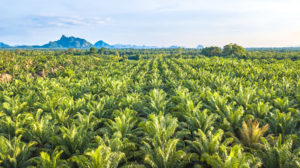Sustainable palm oil produces high yields while benefiting public and environmental health
 Palm oil is a widely used ingredient in processed foods and a popular cooking oil that is often preferred for its affordability when compared to other vegetable oils. Unfortunately, oil palm plantations have come to dominate many tropical systems, and production is criticized for its intensive management that reduces biodiversity, contributes to climate change, and exposes farmworkers and their communities to toxic chemicals. In an effort to improve the sustainability of palm oil production, a recent study published in the journal Frontiers in Forests and Global Change experimentally tested whether oil palm plantations could still produce a high yield while reducing the intensity of farming—that is, while using less fertilizer and replacing herbicides used to control weeds with mechanical weed management. The researchers found that by using more sustainable practices, oil palm yield was not reduced but rather increased profitability because of the reduced cost of inputs. While it could be expected that reduced fertilization would impact the productivity of the soil, the study showed no negative impacts to soil fertility, and instead, found that water infiltration and water-holding capacity increased when less fertilizer was used. The researchers did not find an immediate effect of reduced chemical use on above and below ground biodiversity, suggesting that more time under less intensive management may be needed to see these benefits, and vegetative diversity may need to be added to the monoculture plantations to have a major impact on biodiversity. However, the main findings are important because they suggest that the production of palm oil does not need to be so intensive to obtain high yields, and that incorporating practices to improve the health of the environment and the rural communities can still be profitable.
Palm oil is a widely used ingredient in processed foods and a popular cooking oil that is often preferred for its affordability when compared to other vegetable oils. Unfortunately, oil palm plantations have come to dominate many tropical systems, and production is criticized for its intensive management that reduces biodiversity, contributes to climate change, and exposes farmworkers and their communities to toxic chemicals. In an effort to improve the sustainability of palm oil production, a recent study published in the journal Frontiers in Forests and Global Change experimentally tested whether oil palm plantations could still produce a high yield while reducing the intensity of farming—that is, while using less fertilizer and replacing herbicides used to control weeds with mechanical weed management. The researchers found that by using more sustainable practices, oil palm yield was not reduced but rather increased profitability because of the reduced cost of inputs. While it could be expected that reduced fertilization would impact the productivity of the soil, the study showed no negative impacts to soil fertility, and instead, found that water infiltration and water-holding capacity increased when less fertilizer was used. The researchers did not find an immediate effect of reduced chemical use on above and below ground biodiversity, suggesting that more time under less intensive management may be needed to see these benefits, and vegetative diversity may need to be added to the monoculture plantations to have a major impact on biodiversity. However, the main findings are important because they suggest that the production of palm oil does not need to be so intensive to obtain high yields, and that incorporating practices to improve the health of the environment and the rural communities can still be profitable.


